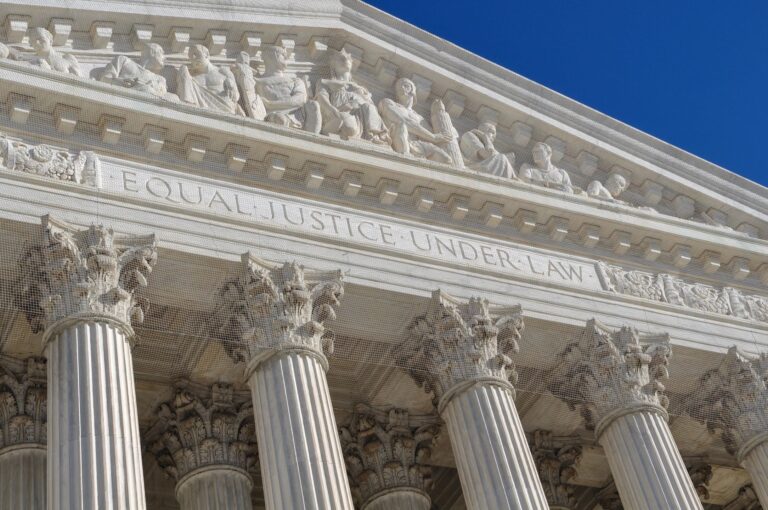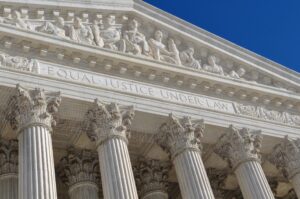[Note: this post is not yet complete]
(Featured image by Tyler Merbler from USA – DSC09254-2, CC BY 2.0, Link)
A recent poll showed that 6% of Republicans would support a violent overthrow of the election if Donald Trump does not win the 2024 U.S. election. The poll also reported that 9% of Democrats would similarly support an overthrow if Kamala Harris does not win. [to do: I am still looking for this article] [to do: find the Washington Post article from 2 years ago]
The justification for such drastic (and undemocratic) action goes like this: if my candidate wins, then the election is fair and legitimate, and everyone else must accept the outcome; whereas if my candidate loses, then the election was rigged, and it is my right to overturn the election by force and install my candidate as U.S. president.
This is the worst, most dangerous case of confirmation bias that I can think of. Confirmation bias is always a danger to reason and truth; but in this instance, it also threatens our social order. It threatens our peaceful and prosperous way of life.
Election Rejection is Already Here
The insurrection of January 6th, 2021 by fanatical supporters of Donald Trump was a warning that the possibility of a violent overthrow is not just a fantasy.

To be fair, many Democrats (and some others) also have a beef with our election system in the Electoral College. [to do: find survey results of support for eliminating the Electoral College] They believe that it is illegitimate, and that only the popular vote for president is. Yet the popular vote is not in the Constitution, and the Electoral College is. It is thus the law of the land. They accept it—but only grudgingly.
A growing consortium of states are part of the National Popular Vote, which aims replace the Electoral College with the popular vote without a constitutional amendment. Though legal—and politically ingenious—this plan could undermine the legitimacy of our Constitution.
Legitimacy is a Perception
Thus, there is widespread distrust and dissatisfaction with our election system. This is disturbing. It could eventually undermine the democratic institutions that are essential for peace and prosperity.
When George Washington stepped down and retired from politics after his second term as U.S. president, it was the first peaceful transfer of power since the Ancient Romans [to do: which emperor did this and when?]. That’s how remarkable our system is.
This system has remained intact for almost 250 years. It has served us well. The fact that it continues to exist is admirable. It is something that we should celebrate even more enthusiastically than the 4th of July, I believe. The success of the peaceful, democratic transfer of power in the USA has inspired many other countries to adopt similar systems. We can’t let it fail.
But it could fail. It is not etched in stone. It continues to exist only because most people perceive it to be legitimate. If this perception erodes enough, people might feel empowered to overthrow it by force. History has shown that this would likely lead to a slippery slope that would end in a disaster for everyone.
Voting by Mail is a Bad Idea, and Voter ID is a Good Idea
One step that we can take to foster the legitimacy of our election process is to minimize the use of mail-in ballots. They are far more likely to suffer from fraud and mistakes. [to do: link to the studies that show this] The belief in widespread fraud undermines the perception of legitimacy.
Instead, we should maximize the use of traditional in-person paper ballots. This is the most reliable and trustworthy ballot process. Mail-in should be used only for people who can’t vote in person. Voting by mail is popular, but this should be only a minor concern compared to the preservation of legitimacy.
Likewise, Voter ID laws are beneficial because they also make people feel that the election is fair and devoid of fraud. Critics claim that voter ID laws are racist, and would disenfranchise minority voters. [to do: is there an estimate of the number of such voters?] Yet few voters are unable to obtain an ID themselves. State governments can assist these people. This is a small price to pay for preventing another January 6th insurrection.
The Only True Solution
Yet these are just baby steps in the right direction. The most important goal should be to convince everyone that we must accept the outcomes of our election system. Voter fraud and election rigging do happen. In many countries, the people have good reason to reject the legitimacy of their elections. We must therefore create a system that wins everyone’s trust.
If we need to revise our election process to achieve this, then so be it.



